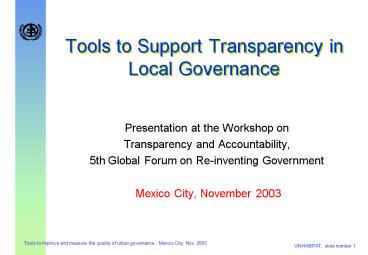Tools to Support Transparency in Local Governance - PowerPoint PPT Presentation
1 / 15
Title:
Tools to Support Transparency in Local Governance
Description:
Tools to improve and measure the quality of urban governance - Mexico City, Nov. 2003 ... Focus on inclusiveness of access to city benefits and decision making ... – PowerPoint PPT presentation
Number of Views:53
Avg rating:3.0/5.0
Title: Tools to Support Transparency in Local Governance
1
Tools to Support Transparency in Local Governance
- Presentation at the Workshop on
- Transparency and Accountability,
- 5th Global Forum on Re-inventing Government
- Mexico City, November 2003
2
The context and challenge
- Global trend towards urbanisation
- Increasing poverty and insecurity
- Unsustainable urbanization patterns requiring
preventive and adaptive approaches - Limited local government implementation capacity
is main bottleneck - New approach to good governance
- Local authorities as enablers
- Emphasis on partnership for service delivery
- Focus on inclusiveness of access to city benefits
and decision making - Promising innovations, but need to scale up
3
The missing link
- The key ingredient to realizing more inclusive
cities is neither money nor technology, nor even
expertise or legislative change (although all
these are important), but good urban governance. - The Global Campaign on Urban Governance, Concept
Paper, 2nd Edition, March 2002
4
Local Government
Urban governance is the sum of the many ways
individuals and institutions, public and private,
plan and manage the common affairs of the city.
It is a continuing process through which
conflicting or diverse interests may be
accommodated and cooperative action can be taken.
It includes formal institutions as well as
informal arrangements and the social capital of
citizens.
- Civil Society
- Private Sector
5
Proposed Principles of Good Urban Governance
- Sustainability
- Subsidiarity
- Equity
- Efficiency
- Transparency and Accountability
- Civic Engagement and Citizenship
- Security
6
(No Transcript)
7
Examples of Practical Measures
- Consultations to build strategic vision for
community - Local Agenda 21 processes
- City Statute legislation to promote inclusion
- Transparent fiscal transfers for weaker local
authorities - Equal access for women to local level
decision-making - Clear cost and quality targets for provision of
public services - City Convenants on timeliness of administrative
services - Participatory budgeting
- City Youth Parliaments - Junior City Councils
- Integrity Pacts between Local Govt and companies
bidding - Community based crime prevention approaches
- Town Hall meetings
- Open and constructive media debate on local
issues - and many more practical measures
8
Urban Governance Toolkit Series
- Participatory Urban Decision Making (PUDM) -
Sept. 2001 - E S - Transparency in Urban Governance (with
Transparency International) - 2003 - E - Participatory Budgeting (with UMP-LAC PB network)
- 2003 - E S - Local-to-Local Dialogues (with Huairou
Commission, 2003) - E - Urban Governance approaches to Water and Land
issues (2004)
9
Local Government Municipal Front
OfficeIndependent AuditDebt ManagementDisclosur
e of Assets Local Leadership Training
Building Bridges Conflict Management
Participatory Budgeting Local-to-Local Dialogues
Integrity Pact Commercialization of Services
Urban Governance Index Urban Poverty
Profile Urban Bribery Index City Consultation
Urban Pact Report Cards
- Vulnerability Assessment
- Building NGO/CBO Capacity
- Civil Society
- Code of Ethics
- for Professional Associations
- Private Sector
10
(No Transcript)
11
The Participatory Process and Tools which Support
It
- I Preparatory and
- Stakeholder
- Mobilsation
- Municipal Checklist
- Stakeholder Analysis
- Profiling
- Vulnerability Assessment
- Gender Responsive Tools
- IV Follow Up and
- Consolidation
- Monitoring Tools
- Programme Evaluation
- Institutionalisation
Feedback
Participatory Urban Decision Making
- II Issue Prioritisation
- and Stakeholder
- Commitment
- Proposition Paper
- Facilitation
- City Consultation
- Urban Pact
- Stakeholder Working Group
- III Strategy Formulation
- and Implementation
- Action Planning
- Programme Formulation
- Demonstration Project
- EMIS
- Conflict Resolution
12
Local TransparencyExpected Development Outcomes
- More equitable and effective service delivery
- Increased accountability, civic engagement and
strengthened citizenship - Enhanced legitimacy of local government
- Improved policy design and implementation
- Greater leveraging of resources from stakeholders
- Increased urban investment
- Reduced corruption
13
Transparency ToolkitIntervention Strategies
- Assessment and Monitoring understanding the
degree of transparency in local governance, while
creating a base-line against which progress in
improving transparency can be measured - Access to information measures to improve
stakeholders access to information - Ethics and integrity tools for clarifying what
is expected from professionals and elected
leaders - Institutional reforms including both
administrative procedures and structural
innovations - Targeting specific issues using specific issues
as an entry-point for improving transparency.
14
Toolkit on Transparencyto include tools such as
- Urban Bribery Index
- Municipal Checklist
- Transparent Procurement Procedures
- Integrity Pacts
- Codes of Conduct
- Public Hearings
- Independent Audits
- Transparent Land and Water Delivery
15
Other features
- 35 tools in 5 categories
- The toolkit explains, for each tool
- the purpose
- the impact on transparency
- how the tool works in practice and
- a case study to illustrate successful application
of the tool - Users are encouraged to add more tools and case
studies for inclusive in future edition of the
toolkit - Publication by end 2003
- Outline handouts available at this workshop.
16
Thank you!
www.unhabitat.org/campaigns/governance/































